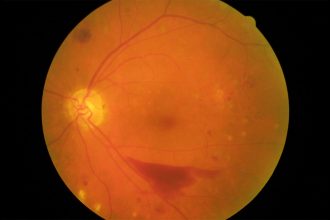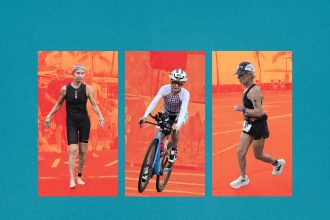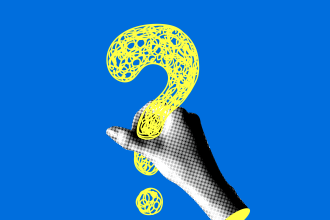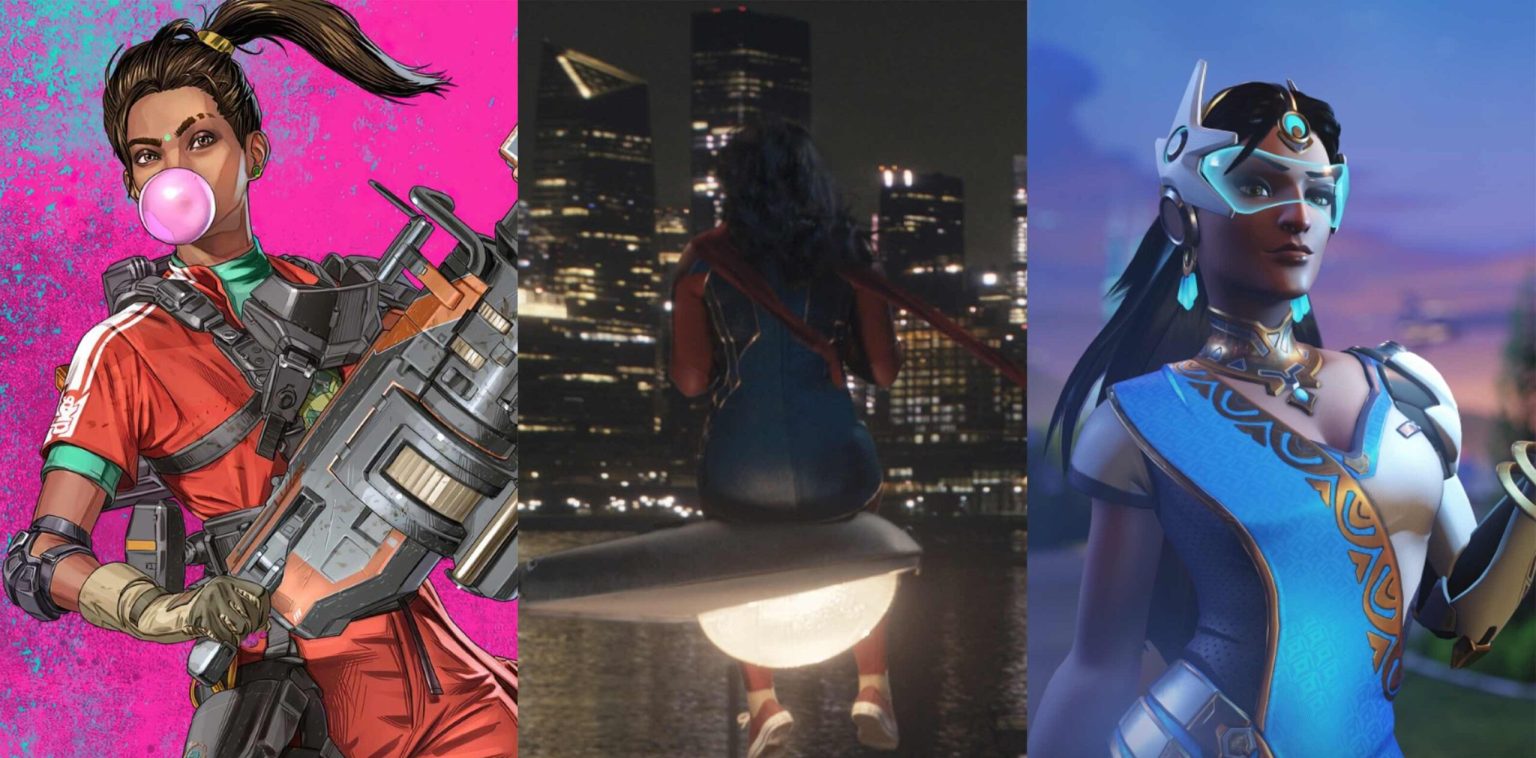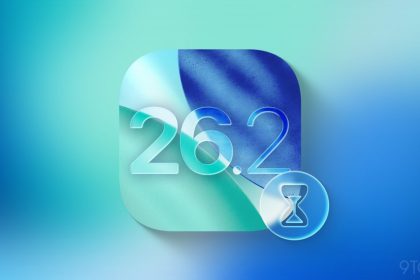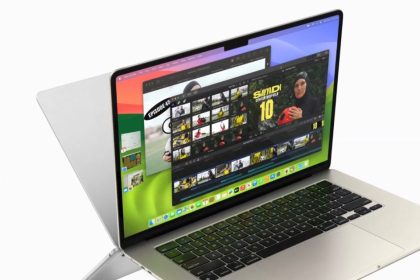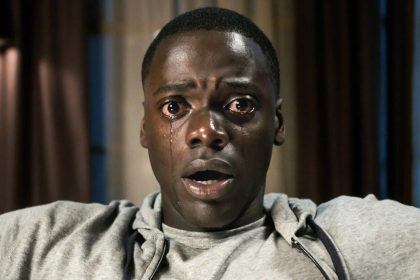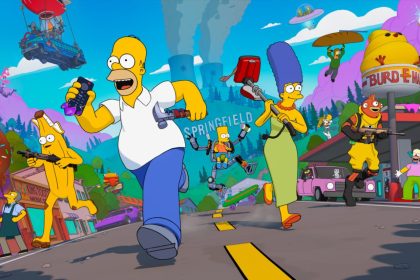When it comes to acting, Anjali Bhimani has pretty much done a bit of everything.
Symmetra in Overwatch and Rampart in Apex Legends, two of the most popular multiplayer video games around. A supporting character, Auntie Ruby, in the universally acclaimed Disney+ series, Ms. Marvel, opposite Markham, Ontario’s own Iman Vellani. Andrew Lloyd Webber’s Bombay Dreams on Broadway. Appearances on popular TV shows like The Sopranos, Modern Family. Co-hosting the culturally authentic Dungeons & Dragons show DesiQuest.
MobileSyrup caught up with Bhimani to reflect on some of her many roles, including those in the upcoming action-adventure game Mind’s Eye and sandbox dating simulator Date Everything! Our interview also coincides with Asian American and Pacific Islander (AAPI) Heritage Month (or simply Asian History Month in Canada), so we talked about what that celebration means to her, South Asian representation in her characters and how fans have responded to it all.
You’ve worked across so many different kinds of media, including TV, film, video games and even tabletop RPGs. What is it about video games, specifically, that’s so unique or special for you?
Image credit: Anjali Bhimani
Anjali Bhimani: There’s so many things. First of all, when I was a kid, I played video games. And I started playing tabletop games when I was eight — playing D&D when I was eight. But that led into playing those kinds of games, the Forgotten Realms, games and stuff like that on the computer. And there is something in particular about the interactivity of storytelling in a video game that adds a layer of connection and ownership for the audience and for the players that isn’t necessarily there in traditional entertainment media. It isn’t necessarily there in television and film or plays. Some plays are in call and response and interactive that way, and you’re definitely in the same room, so that makes a difference. But when you’re watching television and film, and the story is being presented to you, it’s washing over you, and it’s extraordinary, and you’re feeling all the things, but you aren’t part of telling the story, and you don’t necessarily have agency over how the story is told.
But when you’re playing a video game and you are either the hero or the storyteller or the person who’s figuring out the puzzle or all of that, there’s a level of ownership and agency that enables you to have a certain sense of empowerment and a certain sense of control over your own narrative. I love the fact that people can identify with a hero in a game. I really love this about Overwatch and a bunch of other games, too. But Overwatch is one of my favourite examples because there are so many different heroes you can identify with for a million different reasons. It’s not just their background, it’s not just their gender, it’s not any of those. It’s a bunch of different reasons that you can identify with them. When you identify with that hero, you identify the hero in yourself. You identify that “that could be me,” and whether consciously or subconsciously, you can take that out in the world and have that kind of agency. And so games, in particular, have that unique ability to do that for you — that they give you a sense of, at the very least, “I am in the story,” and at the most, “I tell the story, I control the story.” And that’s a really empowering place.
Speaking of being able to tell a story and control a story, RPGs are perfect for that. And you were in Avowed, which [was a well-received RPG], playing one of the main companions, Yatzli. She’s this really fun, energetic, quirky, flirtatious character. What was it like to play that kind of character and work on her with Obsidian? What were some of your favourite parts of recording that?
Yatzli. (Image credit: Xbox)
Bhimani: Honestly, it was just pure fun. I loved the character from the moment I auditioned for her. And I even remembered all the lines from when I went in to record. I was like, “Oh, this line was in my audition, I love this line!” It was one of those times where I read a character and I was like, “Oh, this is just me!” [laughs] This is me, plus… This is an aspect of me that I know well enough I don’t have to dig deep to find a lot of what this is.” And the writing is just so good for that character. So what was it like recording it? It was laughter 90 per cent of the time. It was our directors and our writers having to shut off their camera because they were laughing or me laughing about it, because the line is so hilariously written.
And especially, what I love is that there was such a wide scope of her emotional life to get to play. You don’t always get that in roles in general, but you don’t always get that in video games. Sometimes you get the hero who is pure heroism, or you get the villain who is pure villain. But in this case, she’s got her lighthearted moments, she’s got very touching moments, she’s got very powerful moments. The storytelling in the writing is so good, and the different options for the player — and therefore for me as an actor — of what they’re going to see of this person, what they’re going to see of this character, are so vast that it meant I got to explore all the emotions. You name it, it’s all in there. It was a very, very joyful experience.
Another game that’s coming out this year that you’re in is Mind’s Eye. It’s got a lot of attention because it’s from a former Grand Theft Auto designer [Leslie Benzies]. I’m sure you can’t say too much about it, but is there anything you can tell us about your role and what it was like to work on that project?
Bhimani: I can tell you about my role, what you can see in the trailer, which is that I play Mayor Shiva Vega, who is a character of dubious morality, which I don’t think is surprising. [She] presents one face to the public and perhaps a different one in private. I loved working on this game so much; so many cool stories within the game, and then the gameplay on top of it. The cast that I got to work with were all extraordinary. I had such a wonderful time with all of them. I’m really excited. I’m excited to jump into gameplay, even though I’m terrible at games — really, really bad at games. I’m good at story games and puzzle games, but you put me in front of a first-person shooter, and I will be dead immediately. It’s just not going to happen. So I might have to sit with someone as they play through the game.
On the complete opposite end of the tonal spectrum from this dark sci-fi story… You’re in Date Everything!
Bhimani: Yes! I’m so excited about that one!
It’s coming out [soon] and looks so delightful and funny and charming. So I have to ask: What’s it like voicing a literal bathtub? As an actor, what kind of unique personality do you need to give a character who is a bathtub?
Bhimani: This is the thing. When I was offered the gig, and Robbie Daymond is a friend, and Ray Chase. They came to me to do this, and Robbie took me out to lunch before my session, because he wasn’t going to be able to be there. And he was like, “Here’s your character, and here’s the game, and here’s what’s happening.” So I already had more context than a lot of other sessions I’ve had before. But there is just such a level of delight and openness and easiness in this whole game that it was just big and broad and bombastic and fun.
And this particular bathtub may be different from other bathtubs. You don’t know. Who knows? We don’t know. But Bathsheba is a mix of a lot of things. She’s a little Legally Blonde, she’s a little bit of this, she’s a little bit of that. She’s definitely not an airhead by any stretch of the imagination. But she values different things than other people would value, and she’s gorgeous. They drew her so beautifully. I love all the characters in this game. As I’m seeing all the voice actor reveals that everybody else is seeing, I’m getting more and more excited because I’m seeing like, “Oh, my friend is playing this,” and “Oh, you’re the door!” It’s fun to see which ones of us ended up playing what. And I love baths, so I’m very happy to be voicing the bathtub. She’s really fun. [laughs]
It’s AAPI Heritage Month, which is a wonderful thing…
Bhimani: It is!
Obviously, you’re a woman of South Asian descent. And I’m half Indian [Indo-Guyanese]…
Bhimani: Yeah, I saw your last name, I can tell! [laughs]
Yeah! And that’s something I don’t recall ever really being talked about a whole lot growing up. That’s really something in recent years, we’ve seen a concerted effort to improve that. So I’m curious for you, as a prominent South Asian actor who’s had all these great roles — what does it mean for you to have something like AAPI Heritage Month being more prominent, front and centre and celebrated?
Bhimani: It’s such a crazy thing, Brad. Because when you grow up without that, I feel like there are a lot of different ways you can go. There can be a sense of bitterness or not belonging, or sadness or yearning. It depends. It really depends on your life experience. It depends on how you are accepted. If you are accepted when you are growing up, how it affects your relationships — all of those things. I grew up in Orange County, California, where I think there was one other Indian person that showed up at my high school, maybe my senior year. But I didn’t feel othered, and largely because I grew up playing games. Because I grew up playing Dungeons and Dragons with people of all backgrounds, there was always a seat at the table for everybody. So I didn’t necessarily get the sense that being Indian was “other” in any other way than being Jewish or being Latino. Everybody was “other,” because everybody was a little different. And so I was very blessed that that was my experience — that it was more just a part of who I was, not the defining thing of who I was.
So now, having more attention brought to it and having more focus brought to it, here are the things that I do love about it. One: those people who didn’t get to have a sense of pride over their culture or their background or their history, those people who didn’t have that? Now, [they] have a moment to say, “Hey, I’m proud of this, and we’re going to celebrate this, and we’re going to share this with you.” I also love that now we are finally getting to share stories that aren’t all stereotypical stories from any one culture. And Asian American and Pacific Islander stories are absolutely having that beautiful day. Every Indian story is not all about an arranged marriage. Every Asian story is not all about a samurai. Or if they are, there are stories with more nuance to them, or there are characters with more nuance to them. That, to me, is a beautiful thing.
Because once again, if we can live in a world that reflects this — if we can live in a world where people realize that we are all a sum of so many different things, and that being Asian or being Pacific Islander, being those things — is something we get to share with other people of all backgrounds, including our own, we get to share with other people, to include them in it? When we start to realize that, and we really start to see it reflected in the stories that are told, rather than there being gatekeeping or anything else… When we get to start to celebrate that with people? That’s not just empowering in terms of storytelling; that’s empowering in terms of the way of the world. That is exciting in terms of people not seeing it as “social education,” but they’re seeing it as, “Oh, I get to have a new experience because now I know about this culture.” “Oh, I get to hang out and learn about new foods, new clothing, new traditions, all of these things.” And people being proud of it and open to sharing it and celebrating it and sharing that happiness about it, rather than the sense of like, “Oh, I’m always other.” Having that flip of, “Let me tell you about this,” rather than, “Why don’t you know about this?” That flip in the narrative is everything. It’s everything.
It’s everything to be able to say, “Cool, I am excited to show this to you,” not, “Why don’t you know about this part of me? I’m so sad, or I feel so alone, or I feel so unrepresented.” So even though my experience was different than a lot of other people, I am so grateful and so thrilled that those folks are now getting to have the experience that we have today, and that people who are growing up now don’t know any different. There are kids that don’t know what it’s like not to have a hero that looks like them, or don’t know what it’s like to not see themselves on TV or in plays, because that’s the world we live in now. How amazing is that? How beautiful is that? They’re just like, “Yeah, we’re not like everyone else, but we belong like everyone else. That’s the difference: we’re unique, but we all belong.” So yeah, I love this month. I also love that it is Mental Health Awareness Month and Women’s Health Month. All three of these together in May, it’s a really special month for people to be able to look inside and talk about what they need and then share that openly.
That was so well said. And one of the great examples of that representation is Ms. Marvel. You were part of the [Ms. Marvel] Disney+ show. I love that character so much — getting her in a TV show was awesome. And I think for people like me as well, you have Iman Vellani, who grew up outside of Toronto just like me, playing the main character — that adds to that whole pride of it. And you’re obviously in the show as Auntie Ruby, which is awesome. So you’re a part of that legacy now. And that’s carried on to the characters being in The Marvels, Iman writing comic books, and Mr. Khan was even in [Daredevil: Born Again]. So from your perspective, what’s it been like to see the legacy of that show and that character really balloon in the last few years? Also, when are we getting Season 2?
Canada’s Iman Vellani as Kamala Khan/Ms. Marvel in Ms. Marvel. (Image credit: Marvel Studios)
Bhimani: [laughs] Well, I can’t speak to the last question, but I can speak to the first, which is: it’s been amazing. Ms. Marvel, in the comic books, was already such a wonderful depiction of someone who, just like we were talking about, is not [defined by] their culture, but their culture is part of what defines them. It’s part of who they are. It doesn’t define them as a whole, but it is the palette on which this art is painted. And to have Ms. Marvel herself, to have Kamala, be a character we can all identify with… We’ve all been a fan. We’ve all had to have a point in our lives where we step into our power, and it’s uncomfortable and it’s weird, and maybe we don’t want the responsibility of it. We’ve all had a point where we’ve had to push and get back against our parents, and our parents who love us so much, have had to push back against us. So there’s so much to identify with. There’s so much to connect with.
And then, on top of all of that, to make this television show, and this particular television show, because there was so much attention paid, and so much love put into this show, and so much delight put into this show, by the creators… Even just shooting it was so celebratory and joyful. And then getting to see the critical reception and the reception from people, either of South Asian culture or who didn’t know about South Asian culture, was so extraordinary. I didn’t realize how few people knew about Partition until that show came out. All of a sudden, that show came out, and people were like, “Wait, what’s this? I didn’t know this happened.” And as a South Asian person, you’re like, “This is a big part of my family’s story!” But then you think, “Well, of course, how else are people going to learn? It’s not necessarily in the history books — not in this country.
So we get to tell the story of this beautiful young girl who is stepping into her power, who is awkwardly working her way through life and her family, but we also get to share it amidst this story that will open people’s worlds up to understand more about a history and a culture, and hopefully make them more interested in learning more. And when you’re able to do that, not only do you cultivate enthusiasm, but you cultivate compassion, and you cultivate empathy, and you cultivate understanding. And this show, in such a beautiful way, I think, did all of that without pounding us on the head with it. Because ultimately, it was just a really fun show. Ultimately, you watched the show, and separate from all of that, separate from all noble causes that we may have had going into it, it’s just a really fun show.
And Iman is just the best. She’s so talented, she’s so fun, she’s so smart. She has such a great love for this genre, this fandom. The fact that she’s writing the comic books, I’m like, “Well, yeah, that makes sense!” It’s not like some star just decided that, “Oh, I’m gonna also write comics.” No, she’s the one who should be writing these comic books. That makes perfect sense to me. And I just love watching her step into bigger and bigger things. I’ve said it before: I’m so glad that she’s so young, so we get so many years of enjoying her talent.
That’s so true. In a larger sense, whether it’s Ms. Marvel or DesiQuest or Symmetra, you’ve done a lot to help with the representation of South Asian characters. What are some of the fondest memories you have of fan interactions telling you, “This is what this character meant to me,” or “This is what that character meant to me” — that sort of thing?
Symmetra. (Image credit: Blizzard)
Bhimani: There are so many, Brad — I don’t even know where to begin. I think the overarching theme is this: It’s one thing to see yourself, to see someone who looks like you, depicted in something. It’s another thing to feel like your personal story — whatever it is, whether it is about your culture or not — is being represented. To feel like, “Oh, I have social anxiety, and this character has social anxiety, and now I can connect because someone understands. Someone who wrote this, someone who was playing this, someone understands.” And that identifying with a character — whether you’re identifying with Symmetra, because she is on the spectrum, but she has found a way to both face the challenges — and use them as a reason to make the world a better place? If you’re identifying with that aspect and seeing that and changing the kaleidoscope of how you look at being on the spectrum. Or if you’re coming into DesiQuest, and there’s literally a seat at the table every time for a guest who is not South Asian. And we are always inviting people to the party, literally and figuratively. That’s what I’m hearing from people: they see that, they feel that, they appreciate that, and they love that.
For me, it is the most powerful when the intention is not, “I’m going to show you this. I’m going to put this in front of you, this that looks like you.” When the intention is, “I’m going to tell a great story that is going to touch you. And here’s the trappings, or here’s the setting, or here’s what this character looks like or sounds like or whatever,” and that may attract you to them at first. But that’s not what’s going to keep you there. What’s going to keep you there is a great story. That to me, is vital. Because no one wants to be told, “This is how you should act, or this is what you should do, or or this is how you should think about, people of XYZ demographic.” But everyone will listen to a great story, and everyone will enjoy that together, and then they will connect about enjoying that story.
So yeah, every time someone comes up to me and says something like, “Thank you for what you’re doing for Indian representation.” My instinct is to say, “All I’m doing is telling our stories as human beings in this package and with other people who are doing the same and really getting excited about using our culture as a background for that.” I’m grateful for being seen as a representative, but that’s not my intent necessarily, so much as I am here to tell great stories that touch people and invite people in and change their lives in one way or the other. Even if it just means they laugh their asses off for an hour, whatever it is. That’s what I’m here to do, and that’s what I think keeps people telling stories all through time.
I love that. I love that you could be Auntie Ruby [with] that representation, and then a bathtub as well.
Bhimani: Yes, exactly! [Or] I can be “a Bollywood star” in DesiQuest, and everyone can learn about what Bollywood or Tollywood are, because they experienced that in a TTRPG [tabletop RRG]. It’s fun stuff!
This interview was edited for language and clarity.
Mind’s Eye launches on PS5, Xbox Series X/S and PC on June 10, while Date Everything! drops on PS5, Xbox Series X/S, Nintendo Switch and PC on June 17. Avowed is now available on Xbox Series X/S and PC, plus Xbox Game Pass.
Header image credit: EA/Marvel Studios/Blizzard
MobileSyrup may earn a commission from purchases made via our links, which helps fund the journalism we provide free on our website. These links do not influence our editorial content. Support us here.

